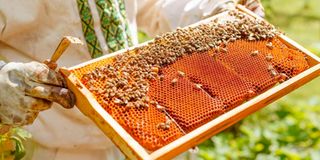
Bernard Kiruthu who keeps bees in an urban area in Nyeri.
News
Premium
Are you a commercial beekeeper? These proposed new rules will affect you
Farmers will be restricted from keeping bees for commercial purposes if the National Assembly passes a new livestock Bill.
Those who violate the requirements detailed in the Bill will be liable to fines of up to Sh500,000 fine or a prison term not exceeding one year or both.
“A person shall not keep bees for commercial purposes except in an apiary, and shall not allow bees to be kept on land owned or occupied by the person unless the land is registered as the location of an apiary,” reads the Bill.

A farmer harvests honey. Farmers will be restricted from keeping bees for commercial purposes if the National Assembly passes a new livestock Bill.
Farmers interested in beekeeping will need to apply for registration to the county Livestock executive who, if satisfied that the farmer has met all the requirements, shall issue a certificate of registration that will be renewable yearly.
However, those who keep their bees in a “device of an approved kind” and use them only for purposes of pollinating crops will not need to be registered if they dispose of their bees and the device within eight weeks after the person becomes a beekeeper.
The Bill also imposes restrictions on the distance between the location of a beehive and residential property.
Public park
“A person shall not leave a hive containing bees within 30 metres of a property line separating the land on which the beehive is kept and land used for a community centre, public park or a place of public assembly,” the Bill further reads.
It also states that should a number of beehives in a given place raise concern as a public nuisance or a danger to public safety, the premises shall be declared unsuitable for beekeeping, and the beekeeper ordered to move the hive.

Martin Onyango, the director Parecma Enterprise checks the hives in the apiary belonging to Ogongo Secondary School. Onyango works with farmers and schools to market honey and its products hence boosting bee-keeping in the region.
The hives, declares the Bill, should also be branded by a registered firm, and a certificate issued after the application is approved and the prescribed fee paid.
Certificate of inspection
The Bill also stipulates that bees will not be imported unless an import permit has been issued and a certificate of inspection signed by an authorised apiary instructor from the country of export, detailing that the bees are free from contagious diseases.
Farmers who abandon or fail to dispose of bee colonies, honey combs or hives will be charged by the authorities that will take over the role of disposal.





